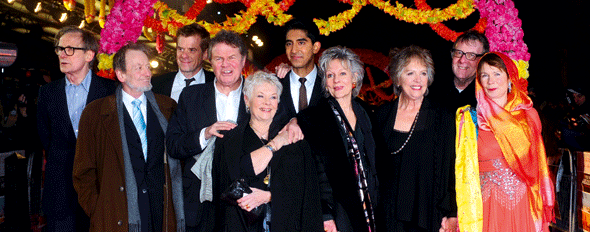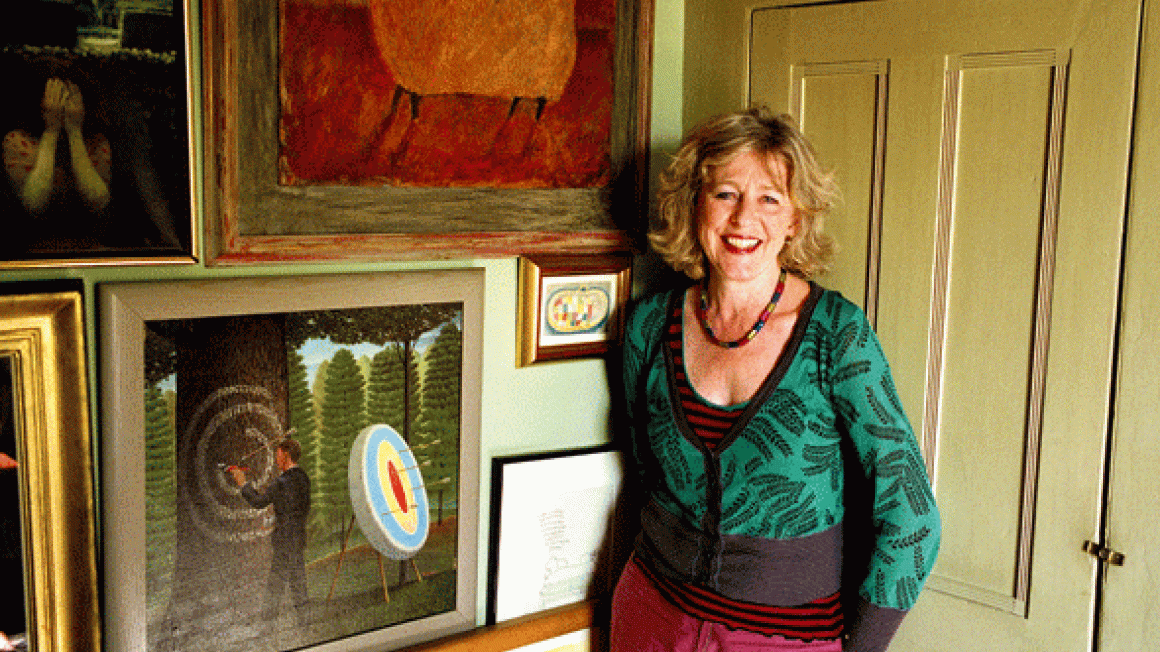My exotic retreat for the elderly & beautiful
Deborah Moggach, the novelist, is sitting, with her legs tucked up on a sofa in her house in North London, recounting her mother’s final years. Before she died three years ago, her mother, who was a keen gardener, started pulling up plants and leaving the weeds. ‘She whistled tunelessly all the time, started writing weird notes to people and doing obsessive things, such as endlessly clearing out her drinks cupboard.’ Then she broke her leg while walking the dog and was admitted to hospital.
‘What I have observed,’ Deborah says, ‘is that when you start getting rocky mentally, your little routines become terribly important, and hospital blows that to pieces. All the careful tiny constructs you have in your life fall apart and you cannot piece them together again. My mother left hospital with full-blown dementia.’
Deborah’s mother Charlotte continued to live in her own house in Camden, London, with the help of Deborah, her sister Alex and an army of friends, but one day she collapsed after the largest of a series of strokes. ‘For the last two weeks she didn’t eat. She was shutting up shop. That last fortnight she was pretty comatose, but what was rather nice is that my sister and I started clearing up and I read a lot of her letters, which brought back the person she was… including the transcripts of her trial for murder.’
Charlotte attended the progressive private school Frensham Heights in Surrey and then met Deborah’s father Richard Hough, a glamorous figure who later trained to be a fighter pilot in Hollywood. Charlotte joined the WRNS, Richard the RAF and they married in uniform. In 1941, Charlotte’s troubled half-brother, Roger Roughton, a communist and poet, committed suicide. ‘He gassed himself in Dublin after Russia and Germany signed the non-aggression pact. But I don’t think anyone ever kills themselves for politics. I think he was gay.’
Deborah’s grandmother, who discovered her son’s death in the newspapers, pawned her last ring to take the ferry over to identify the body. After the war, Deborah’s parents found themselves with no training and no money. Her father went into publishing and was to become the author of 150 successful naval histories and biographies – while Charlotte, who was very good at drawing, started illustrating, and later writing, children’s books: ‘She was childish herself in many ways. She had a hotline to children.’
They eventually settled in St John’s Wood, North London, with their four daughters (three remain – Deborah’s youngest sister died following a blood clot at the age of 40) and Deborah’s grandmother, who was to live with them for the rest of her life.
Was Charlotte a good mother? ‘No,’ Deborah replies baldly. ‘She was perfectly affectionate and perfectly amiable in many ways but she wasn’t interested in children. My father brought us up, and my granny. My mother lived a hugely powerful, fantasy life. She couldn’t clean the house unless she pretended to be Gretel in a cottage in the country. It has taught me a lot about dementia because that fantasy life can be just as real as so-called reality, which can be quite boring.’ Difficulties intensified in the late 1970s when Deborah’s grandmother died of pneumonia.’
To everyone’s surprise, her parents separated almost at once. ‘Some chemistry, some balance with the older generation, dissolved. It was a mystery to us all.’ The family, which had been ‘big and vivid’, imploded. Charlotte moved to Camden, to a house opposite the one Deborah was living in and in some ways, their relationship was reversed. ‘I used to vet her boyfriends. I remember reading one the riot act because he was two-timing her.’
It was during this period – the early 1980s, ironically it was after writing her first thriller, The Bassington Murder, that Charlotte fell foul of the law. ‘My mother belonged to the Progressive League, and they used to discuss assisted suicide. At the same time she was visiting a woman called Annetta Harding who lived in sheltered housing in Primrose Hill.
‘She had nobody, and was terribly ill with cancer, almost blind. She told my mother she was going to take an overdose. She had got the whole rigmarole in place – typed a thing around her neck saying, ‘Do Not Resuscitate’, all the pills. She asked my mother to sit with her and told her to make sure she was dead before the warden came round, to put a plastic bag over her head if necessary. And my mother did. And after a while Annetta stopped breathing. And mymother tidied up and let herself out.’
Her mistake was to tell not just her daughters but her friends at the Samaritans, where she also worked. Someone there informed the police and she was charged. ‘I remember biking into Camden Town and seeing this placard saying ‘Thriller Writer Arrested’ and thinking, ‘That’s neat’ and then ‘Crikey, it’s her.’”
It was baffling to Charlotte that the law might find her anything but innocent. She was tried at the Old Bailey and pleaded guilty, with some reluctance, to attempted murder. ‘It’s extraordinary when they are taken down in the Old Bailey – it is as if somebody has died. The clanging of doors and they disappear into the underworld, like Orpheus, and they’ve gone.’
Charlotte was 60 when she entered Holloway, and later Sutton Park, to serve her six months in 1985. She was also upper-middle class. ‘It wasn’t her world,’ Deborah says drily. ‘She was hugely bullied by inmates and some of the officers. Horrible things, like having a bucket of cold water thrown over her in bed.
‘She lost a lot of weight and her teeth were terrible. People kept saying, “You must write it down” and all those chat shows wanted her, but she wouldn’t. She could be very stubborn. Not that she wouldn’t talk about it. She was always saying, “When I was in prison,” and bringing dinner parties to a shuddering halt.’
After her incarceration, Charlotte’s role as a mercy killer became a family joke. ‘If any of us got completely demented, we’d just say, “Send for Charlotte”. The irony is that she was the one who got it.’
The experience has left Deborah infuriated by the way the medical profession deals, mostly, with dementia patients. One of her novels, These Foolish Things, reprinted as The Best Exotic Marigold Hotel and now a major Hollywood film, is about outsourcing the elderly to India. ‘It’s amazing how many people have said to me it’s a good idea. We outsource everything else, why not outsource old people to somewhere warm and cheap, where the elderly are respected?
‘Here they don’t know what they are doing. It’s amazing how many doctors ignored us and asked my mother questions that bewildered and frightened her, then solemnly wrote down her answers. And how little liaison there is between the professionals. Getting drugs from them is like blood from a stone, and yet the wastage is staggering. When she died we found probably £10,000 worth of pills.’
However, it’s the lack of humanity that disturbs her most. ‘The default position for a lot of staff is to turn their backs physically. At the nurses’ station, their heads are bent, filling out their forms or on their mobile phones, or talking to each other. They are not interacting with the patients. They are just carcasses to be serviced.
‘Teach staff that these are people. Do the thing I never saw being done. Sit with them for a bit. Have a natter. Give them a kiss. Hold their hand. Talk to them. Listen to them. Acknowledge them. I used to bring in my mother’s books. The nurses looked and said, “No! Really?” And I said, “This is an amusing, clever, funny woman, difficult in all sorts of ways. But she is a person.” They forget that.’
The Best Exotic Marigold Hotel, published by Vintage, priced £7.99, is out now.

From left:
Douglas: Bill Nighy Married to Jean, Douglas is the group’s resident henpecked husband.
Norman: Ronald Pickup Relentlessly lecherous, he has been expelled from several retirement homes.
Graham Broadbent: Producer.
John Madden: Director.
Evelyn: Judi Dench Recently widowed, Evelyn finds romance in India.
Sonny: Dev Patel Sunnily optimistic, Sonny is determined to make a haven for his elderly clients.
Muriel: Diana Hardcastle Muriel is a working-class Londoner who flees Peckham after being mugged.
Jean: Penelope Wilton Jean is bitter at Douglas for sinking his pension into their daughter’s internet business.
Graham: Tom Wilkinson Outed as homosexual at work, Graham heads for India to get away from it all.
Madge: Celia Imrie The bossy head girl, she’d rather everyone did things her way.


